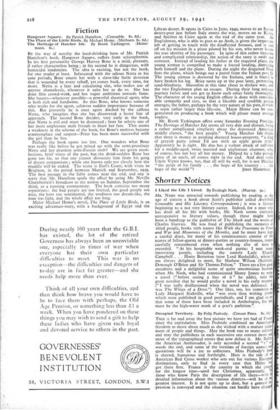Fiction
By the way of novelty the hard-drinking hero of Mr. Patrick Hamilton's book, Hangover Square, suffers from schizophrenia. In his first personality George Harvey Bone is a mild, pleasant, if rather characterless being ; in his second he is dangerous, with homicidal tendencies. The idea is exciting, but not the book, for one reader at least. Infatuated with the odious Netta in his sane periods, Bone courts her with a slave-like futile devotion that is wounded by every rebuff, yet comes back, every time, for more. Netta is a lazy and calculating slut, who makes use of anyone shamelessly, whenever it suits her to do so. She has done film crowd-work, and has vague ambitions towards fame. She haunts—whenever possible—a powerful theatrical agent, who is both rich and handsome. So that Bone, who knows someone who works for the agent, achieves sudden importance because of this. But presently he is once again ditched by the callous Netta, who . imagines that she has discovered a faster line of approach. The second Bone decides, very early in the book, that Netta is evil and must be destroyed ; later he selects one of her more unpleasant male friends to share her fate. This seems a weakness in the scheme of the book, for Bone's motives become commonplace and suspect—Peter has been more successful with the girl than he has.
Perhaps the book opens too late. One wonders what Bone was really like before he got mixed up with the semi-prostitute Netta and her drunken semi-Fascist mob? We are given recol- lections, brief vistas of the past, but the drink-sodden Bone has gone too far, so that one cannot dissociate him from his gang of dreary companions ; while one knows only too clearly how the muddle will be ended. The scene is Earl's Court, with visits to Brighton, in the period between Munich and September, 1939. The best passage in the fable comes near the end, and orip is sorry that Mr. Hamilton spoils the effect by using Mr. Neville Chamberlain's broadcast to the nation on Sunday, September the third, as a running commentary. The book contains too many repetitions : the bad people are too limited, the good people too nice, the hero too sentimental, the seediness too dream-like, the tone too light, and the whole affair too long.
Major Michael Home's novel, The Place of Little Birds, is an exciting adventure-story, with a background of Egypt and the Libyan desert. It opens in Cairo in June, 1940, moves to an Italian desert-post just before Italy enters the war, moves on to Kufra, and finishes in Cairo again at the end of the same year. An Englishman, who is able to pass as an Arab, is given the important job of getting in touch with the disaffected Senussi, and is sent -off on his mission in a plane piloted by his son, who never learns the true identity of his passenger. In spite of this rather tiresome and complicated relationship, the action of the story is swift and constant. Instead of landing his father at the required place, the young airman is compelled to make a forced landing, damaging both himself and the plane. During the night the disguised Brice fires the plane, which brings out a patrol from the Italian post D. The- young airman is doctored by the Italians, and is found to have broken his leg. Brice turns up at the post later, .pretending sand-blindness. Mussolini at this time chose to declare war, and the two Englishmen plan an escape. During their long arduous journey father and son get to know each other fairly thoroughly. The character of the young English officer is done with consider- able sympathy and care, so that a likeable and credible person emerges; the father, perhaps by the very nature of his past, is made to seem rather larger than life-size. Major Home can be con- gratulated on producing a book which will please many average readers.
Mr. Booth Tarkington offers some Saturday Evening Postiche. The Heritage of Hatcher Ide seems all very dim and distant, being a rather complicated simplicity about the depressed American middle classes, " the best people." Young Hatcher Ide thinks that there is money in painting decayed house-property, " a kind of greyish putty colour . I'd .use . with an apple green trim." Apparently he is, right. He also has a violent attack of calf-love for a middle-aged, twice married and unpleasant charmer, who, of course, has not lost all her money. Helped by a fake period. piece of an uncle, all comes right in the end.- And dear noble Uncle Victor knows, too, that all will be well, for is not Hatcher "the pride of his family . . . the hope of his country . . . the


































 Previous page
Previous page